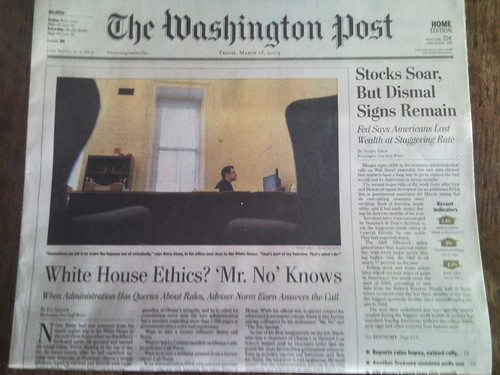"I want to do everything I can to make this thing work, this new presidency work."- Chris Matthews, November 8, 2008
My concerns are growing about the press being independent. I think most people would agree that the major media outlets, as do most people, have a favorable opinion of President Barack Obama. While a president liked by the people certainly doesn't bother me, a president that is fawned over by the media does not bode well for said government to be kept in check.
The Washington Post has been running profiles of Barack Obama, his family, Cabinet members, and his staff seemingly every day. Not surprisingly, the stories tend to treat their subjects somewhere in the range between positive and fawning.
The March 13, 2009 edition, however, struck me as particularly "non-independent." The picture below shows the above-the-fold, front page of the Washington Post that Friday:
 Above the fold -- the most coveted real estate on a newspaper -- were only two stories: 1) an article about the economy, and 2) an article about President Obama's ethics adviser, Norm Eisen.
Above the fold -- the most coveted real estate on a newspaper -- were only two stories: 1) an article about the economy, and 2) an article about President Obama's ethics adviser, Norm Eisen.The Eisen article was a puff piece, to be sure, but what was even more frustrating was the 8" by 5" photo of Eisen's office, with Mr. Eisen -- the object of the story -- only comprising a tiny fraction of the photo.
To put it more clearly: there is approximately 100 square inches of newspaper space available above the fold on the front page. Of that 100 square inches, the picture of Eisen's office took up 40, and the article an additional 25 square inches or so. And Mr. Eisen's appearance in the picture? One square inch (and that's generous).
What stories did the
- A pattern of D.C. teachers allegedly being attacked by students.
- House Speaker Nancy Pelosi denying that a second stimulus bill will be prepared soon.
- Pope Benedict XVI issuing an unusual letter acknowledging his mistakes over embracing an excommunicated bishop who denied that Nazis killed Jews in gas chambers.
I recognize that the Washington Post is a business, and wants to provide content (i.e., anything Obama-related) in which its readership will be interested, and be willing to purchase. That being said, the Post is going a little overboard by having fully 40% of print space taken up by a nondescript picture of a nondescript office (bringing attention to a nondescript article).
Of course, complaining about the media being essentially public-relations outlets for the government (as well as for big business) is well-trod ground, with Edward Herman and Noam Chomsky's Manufacturing Consent one of the better-known depictions of the propagandizing role the press has assumed.
Having the press NOT be "independent and committed to discovering and reporting the truth" (as Herman and Chomsky portray quite convincingly) is the price we pay for two qualities of the modern press: the supremacy of advertising revenue, and the concentration of media ownership.
The consequence of advertising dollars being the dominant revenue stream for newspapers is that the interests of the advertisers take precedence over the interests of the subscribers. As a result, the newspaper cannot afford to take too many controversial stances, or turn over too many rocks, because that may scare away any staid, don't-rock-the-boat advertisers.
The second feature of the modern press -- concentration of media ownership -- also causes it to shy away from its traditional role of exposing malfeasance. The behemoth corporations that own many of the media outlets -- GE being a perfect example -- frequently have large contracts with government along their other lines of business. (Many subsidiaries of GE, for example, have government contracts in the fields of aviation, energy, healthcare, electrical distribution, and security.)
These corporations do not want to jeopardize any of their ongoing and potential government contracts by taking hard-hitting stances that might expose malperforming (or worse) government elements.
Not that I am only pointing blame at the Washington Post for its performance during the Obama Presidency. As Amanda Terkel itemizes in a scathing post, the Washington Post banged the loudest war drums during the run-up to the Iraq War in 2003, despite convincing evidence that Iraq had no WMD.
Much like it will be difficult to roll back the government's intrusion in our lives, expecting the press to get religion and start playing its



No comments:
Post a Comment